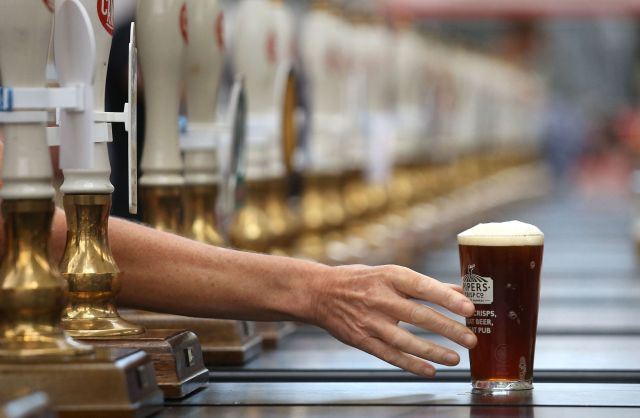Philip Toscano/PA Wire/PA Images

The unstoppable expansion of Amazon appears to represent the future of capitalism: domination by the tech giants and the automation of our jobs.
And yet, in the Atlantic, Derek Thompson reports on one industry moving in the opposite direction – the US beer industry:
“…between 2002 and 2007, employment at breweries… declined in the midst of an economic expansion.
“But in the last decade, something strange and extraordinary has happened. Between 2008 and 2016, the number of brewery establishments expanded by a factor of six, and the number of brewery workers grew by 120 percent. Yes, a 200-year-old industry has sextupled its establishments and more than doubled its workforce in less than a decade.”
One might suspect that American workers are drowning their sorrows, thereby expanding a market in which new entrants can find a niche. In fact, overall US beer consumption has declined, meaning that the smaller breweries are taking market share from the big players:
“Between 2007 and 2016, shipments from five major brewers—Anheuser-Busch, MillerCoors, Heineken, Pabst, and Diageo, which owns Guinness—fell by 14 percent. Goliaths are tumbling, Davids are ascendant, and beer is one of the unambiguously happy stories in the US economy.”
It’s a story that runs counter to the conventional wisdom:
“Technology and globalization are supposed to make modern industries more efficient, but today’s breweries require more people to produce fewer barrels of beer. Moreover, consolidation is supposed to crush innovation and destroy entrepreneurs, but breweries are multiplying…”
Does that mean that the commercial success of the craft beer movement is just a load of froth? Is the bitter truth one of collapsing productivity? No, because while Americans are drinking less beer by volume, they’re paying more for it. Quality has trumped quantity – and furthermore the kind of quality that comes not from standardised perfection, but from specialised craftsmanship.
In December, I asked which were the jobs most likely to survive the march of the robots. This was was my conclusion:
“In a world where most goods and services become increasingly abundant as a result of automation, the ability to add to the human experience in an irreplaceable and enriching manner will become evermore valuable.”
For many people, beer is one of the things that makes life worth living – not as a means of blotting out the world, but of experiencing it more richly. Controversially, I would venture that there’s more to life than beer alone – which is just as well because we can’t expect micro-breweries to employ everyone. Rather, we need an economy in which craftsmanship of all kinds can flourish.
Governments need to start preparing their people for the mass automation of the workplace. Like it or not, many of the jobs that people do today will be done by robots tomorrow. In finding something else for them to do, culture is a big part of the answer.
By this I mean culture in its widest sense, not just the privileged art forms that conventional ‘culture policy’ is concerned with, but the crafts – like brewing – that add shape and texture to everyday life.
It is here that we can build commercially-viable industries in which people can’t be replaced by robots. If the point of making something is to make living more enjoyable, not more efficient, then the human touch is irreplaceable.










Join the discussion
Join like minded readers that support our journalism by becoming a paid subscriber
To join the discussion in the comments, become a paid subscriber.
Join like minded readers that support our journalism, read unlimited articles and enjoy other subscriber-only benefits.
Subscribe